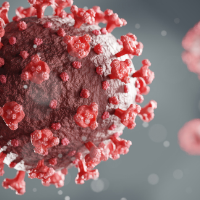
By David C. Dale, MD & Peter Newburger, MD*
The Severe Chronic Neutropenia International Registry (SCNIR or Registry) maintains a database on the infectious complications and other serious health events for patients enrolled in the Registry. Since the epidemic began in February 2020, 15 patients with positive antibody tests have reported to the Seattle office about their illness and complications. Most of the cases occurred between February 2020 and February 2021, with the highest frequency in September to November 2020. The age range was broad, 2-62 years; the average was 29 years. There were 9 females and 8 males.
Symptoms of Covid 19 infection were very similar to other patients without neutropenia. Usually the illness began with fever or fatigue and headaches, resembling a common cold. More severe cases also had the loss of smell and taste, difficulty breathing and symptoms of acute pneumonia. 12 patients were ill enough to go to the emergency room or urgent care center, only one was hospitalized and data is not available for 2 others. Examples are: twin sisters with severe congenital neutropenia, who were doing well on G-CSF treatment, return to college in August 2020. Both acquired Covid 19 infection with typical symptoms that were relatively mild and they recovered uneventfully except for a prolonged loss of taste and smell. Another young adult with severe congenital neutropenia on treatment with G-CSF for more than 7 years went off to college and then became involved with providing urgent care at an urban hospital. This was before the availability of the Covid 19 vaccines. He acquired Covid 19 infection and died quickly from pneumonia. This is the only known death in US patient with severe chronic neutropenia.
The SCNIR cooperates with a large European network to study the treatments and complications of chronic neutropenia. The European data is similar to the US data. The only death was in a patient with a serious heart abnormality. The US and Europe patients have continued their usual G-CSF treatment. There is also accumulating data on cancer patients undergoing chemotherapy were radiation therapy and receiving G CSF. There is no suggestion that it worsened symptoms or outcomes. With the availability of the Covid 19 vaccines, the number of patients with infections has decreased dramatically.
Based on these observations I recommend:
- Covid 19 vaccination for all SCN patients and their families. Children should be vaccinated as soon as we learned the safety of the vaccine for children and and it is approved by the FDA.
- G-CSF treatment should continue as usual and not be interrupted for fear that neutrophils will make Covid 19 pneumonia worse.
- Practice prevention with facemask, social distancing, good hygiene including thorough handwashing and avoidance of crowded places.
- Patients with symptoms of Covid 19 should seek medical attention promptly. Go to urgent care/emergency care promptly; do not be afraid to contact your doctor or go to a hospital emergency.
Testing for antibodies to SARS-CoV2 (COVID-19) is useful for diagnostic testing, but not for determination of immunity to COVID-19 or response to vaccine. The tests vary quite a bit and may not detect some vaccine responses unless part of a research program tailored to the specific vaccine.
*courtesy of the National Neutropenia Network




